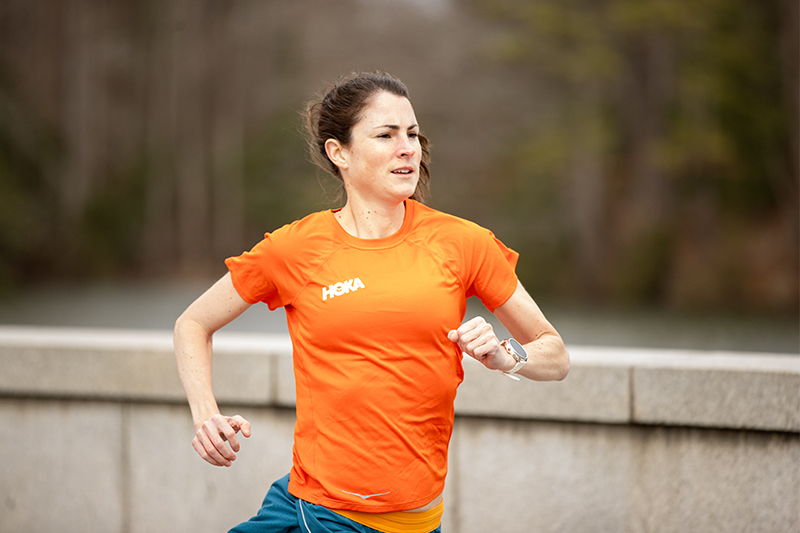
Read time:
Dr. Sabrina Little’s lab is the open road. And her preferred research tools are her running shoes.
Little, a world class ultramarathoner and assistant professor in the Department of Leadership and American Studies, uses theories honed while running as a basis for the philosophy lessons she teaches her students. And now, she’s published a book about those principles, “The Examined Run. Why Good People Make Better Runners,” that has risen to the top as the No. 1 ranked new release on Amazon in the category of Running and Jogging.
Little has found her path, literally and figuratively, by melding her passion for running with her love of being a philosophy professor and infusing the next generation with knowledge and ideas she has amassed as she has conquered mile after mile. Running has allowed her to explore the virtues and vices she writes about in her research, while training and racing. She diligently tries to uphold the values she teaches, many of them rooted in virtue theory and moral psychology with a twist of athleticism.
“The way in which I act as an athlete will translate into the rest of my life,” said Little, who can often be found running on the nearby Noland Trail.
Little’s book, her first, was released this month. In it, she explores how running can serve as a platform for developing character. She delves into how running might be used as a laboratory for the formation of good character, or might not.
“If we make imprudent choices in our training, fail to persevere, or act rashly when we ought to hold back, we may be developing our character in ways that impact our lives for ill. Not all of the ways that sports form us are productive.
“This was an opportunity to write and speak on these things,” she said. “No project I have ever done has captured my two vocations as well as this book.”
Little said the book poured out of her in a way that no other project has. On its pages, she combines her zeal for athleticism and academics, one complementing and informing the other.
“Virtues and vices are acquired by practice,” said Little, who has a doctorate in philosophy from Baylor University and degrees from Yale Divinity School and the College of William & Mary. “I think about character all the time.”
The aspects that make someone a strong athlete, she said, also have the capabilities to shape that person into someone who has the attributes to succeed in life and at being a good person. She is fascinated by how athletics and virtue are interconnected.
“Athleticism is a laboratory for virtue,” she said.
In “The Examined Run,” Little ponders how “ways in which I act as an athlete will translate into the rest of my life. So, that means asking more precise questions about that.
“The book looks at acquiring a vocabulary for what a rich, athletic life could look like, and what flourishing as an athlete could look like on balance with other commitments in your life. I think these are valuable questions, so that’s what I do in the book,” she said.
Little’s life has been influenced heavily by her parallel interests in running and philosophy. She began running as a young child. She played many sports, and competed in cross country and track in middle school. It quickly became apparent that she not only had endurance, but that running brought her a huge amount of joy.
Running was a key part of her life for decades. After high school. She continued running competitively at William & Mary.
Running is what powers Little. It’s her fuel, both for mind and body.
“I love the feel of it,” she said.
Being out on runs gives Little the time and space to think, to feel free, to appreciate the power of her body, and to contemplate some of life’s biggest questions. It also gives her permission to unplug. She generally runs in silence. Each week, Little, the mother of two young daughters, runs between 75 and 80 miles.
“It’s a time when I’m unencumbered by devices, free to wonder and think about things,” she said. “It’s my way of being in the world. It has helped form who I am and helps me live a well-ordered life.”
Little is an endurance runner, at times running in competitions that have 150-mile courses. She has qualified multiple times for the U.S. National Team and has been sponsored by big companies such as Hoka. She has participated in 24-hour races.
Despite all her accomplishments, Little, who focuses on moral psychology, virtue, ethics and leadership ethics, is not one to walk into the classroom bragging. In fact, she said, most of her students don’t know that she’s an accomplished runner, or even an athlete. Her focus is on being an effective teacher.
“I think when you enter your classroom, it should be about the students,” she said. However, running has helped her develop into the student-centered professor she adores being. She freely and quietly lets her experience as an athlete lend dimension and perspective to her classes.
“I think the balance between running and academics is a perfect combination,” she said. “I think in a world that’s increasingly distracted and busy, it gives you the space to wonder, to think about things, to reflect on your work and interactions with students.
“It’s so valuable as a teacher. You can’t be writing all the time. You also can’t be running all the time,” she said. “So, when I’m teaching, I’m resting, I’m recovering, and I’m being stimulated in different ways. And vice versa, when I’m running, I’m recovering from academic life.”